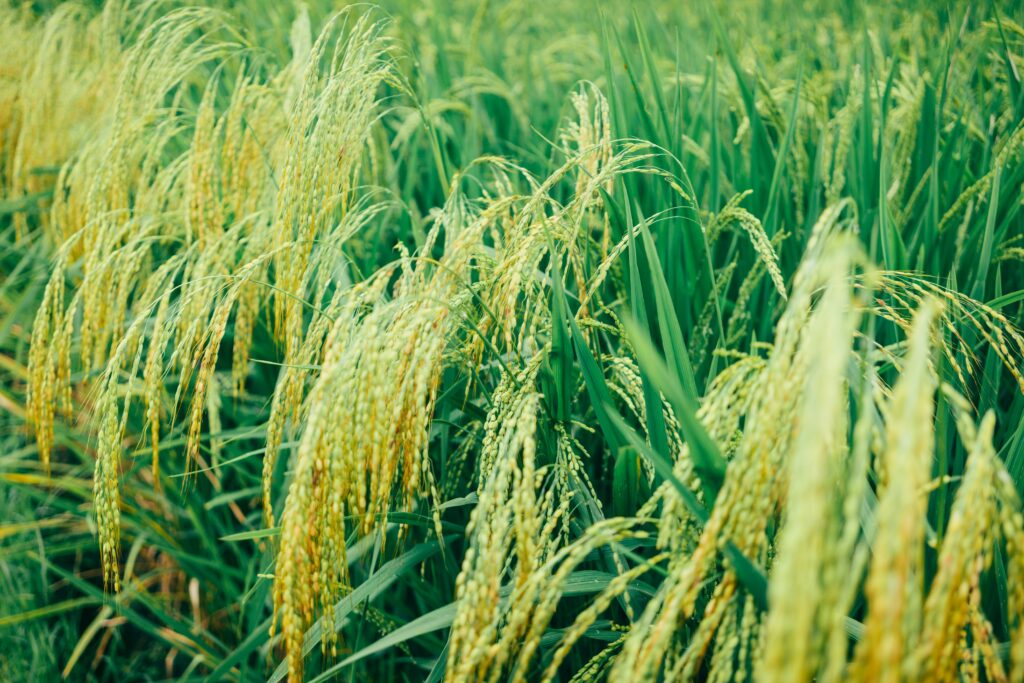Introduction
Rice is one of Pakistan’s most important staple crops, and District Okara plays a significant role in its production. But to get a good harvest, just water and seed aren’t enough. Fertilizers are the secret to turning your average yield into a bumper crop. In this blog, we’ll break down what fertilizers rice needs—especially in the context of Okara’s soil and climate.
Overview of Rice Crop Nutrient Needs
Macronutrients
- Nitrogen (N): Promotes leaf growth and tillering.
- Phosphorus (P): Strengthens root systems and early plant growth.
- Potassium (K): Improves grain filling, disease resistance, and plant strength.
Micronutrients
- Zinc, Boron, Iron, Manganese: Small in quantity but vital for overall health and development.
Understanding District Okara’s Soil Profile
Soil Type
Okara has predominantly loamy and clay-loam soil which retains moisture well—ideal for rice.
Water and pH Levels
Groundwater is generally available, but areas vary in pH, sometimes reaching slightly alkaline levels (7.5–8.5), which affects nutrient uptake.
Common Deficiencies
- Zinc deficiency is very common in rice fields here.
- Low organic matter is also a recurring issue.
Major Fertilizers Needed for Rice in Okara
Urea (Nitrogen Source)
- Apply in split doses: one-third during transplanting, one-third at tillering, and the final third during panicle initiation.
DAP – Di-Ammonium Phosphate (Phosphorus Source)
- Best applied before transplanting as a basal dose.
SOP or MOP (Potassium Source)
- SOP is safer in high pH soil. Apply during panicle initiation for better grain filling.
Zinc Sulfate
- Critical for early plant growth and disease resistance.
- Apply 10–12 kg per acre pre-transplanting or as foliar spray.
Boron
- Helps in flowering and grain setting.
- Apply 1–2 kg per acre as foliar spray during flowering.
Fertilizer Application Stages for Maximum Yield
- Basal Dose:
Mix DAP, zinc sulfate, and half the potassium before transplanting. - Tillering Stage (25–30 days after transplanting):
Apply the first top-dressing of urea. - Panicle Initiation (50–60 days):
Apply the rest of urea and potassium.
Ideal Fertilizer Schedule for Okara Farmers
- Pre-sowing Soil Test: Get your field tested to avoid over- or underuse.
- Sample Split NPK Program (per acre):
- 90 kg Nitrogen (Urea)
- 60 kg Phosphorus (DAP)
- 40 kg Potassium (SOP)
Organic and Biofertilizer Options
Farmyard Manure (FYM)
- Apply 1 trolley per kanal for boosting soil fertility.
Green Manuring (Sesbania)
- Plow into the soil 40–45 days before transplanting rice.
Biofertilizers
- Use Azolla or blue-green algae in flooded rice paddies to add nitrogen naturally.
Water-Fertilizer Management in Okara
- Irrigation Timing Matters:
Apply fertilizer right before irrigation so nutrients reach roots, not wash away. - Flooding Caution:
Avoid applying fertilizers when fields are waterlogged.
Common Fertilizer Mistakes to Avoid
- Overuse of Urea: Leads to weak stems and pest issues.
- Ignoring Micronutrients: Can cut yield by up to 30%.
- Skipping Soil Testing: You’re shooting in the dark without it.
Government & Private Support in Okara
- Punjab Agriculture Department often provides:
- Subsidies on zinc sulfate and DAP
- Free soil testing vans
- Zai Agri Complex & Haruto Engineering provide expert advice and branded fertilizers with delivery.
Recommended Brands in Okara
- Engro Fertilizers
- Fauji Fertilizer Company (FFC)
- Fatima Group
- Zarkhez
- For Zinc: Use Zingro or Zincolac
- For Boron: Try Borex or Borstar
Cost-Benefit Analysis
For a 1-acre field:
- Fertilizer cost: Rs. 8,000 – 12,000 (depending on quality)
- Expected yield boost: 4–6 extra maunds
- Market rate: Rs. 3500+ per maund = Extra Rs. 14,000–21,000 income
That’s 2x return on your fertilizer investment!
Farmer Tips from Okara Region
- “Always mix FYM with DAP for stronger roots.”
- “Don’t skip boron—grain development depends on it.”
- “Use a laser leveler to save water and fertilizer both.”
Conclusion
Fertilizers are like vitamins for your rice crop—without the right type and dose, your harvest won’t reach its full potential. Okara’s soil is fertile, but targeted fertilization, especially with nitrogen, phosphorus, potassium, and zinc, can make a major difference. Pair that with proper timing and water use, and you’re on your way to a record-breaking yield.
FAQs
1. What is the best fertilizer for rice in District Okara?
A combination of Urea, DAP, SOP, and Zinc Sulfate is ideal.
2. How much zinc should I apply per acre?
About 10–12 kg of Zinc Sulfate before transplanting or as foliar spray.
3. Can I grow rice with only organic fertilizers?
Yes, but you may get lower yield. Mixing organic with chemical gives best results.
4. When should I apply urea?
Split it across three stages: transplanting, tillering, and panicle initiation.
5. Where can I buy quality fertilizers in Okara?
Zai Agri Complex, local Engro dealers, and Fatima Fertilizer outlets are good options.

